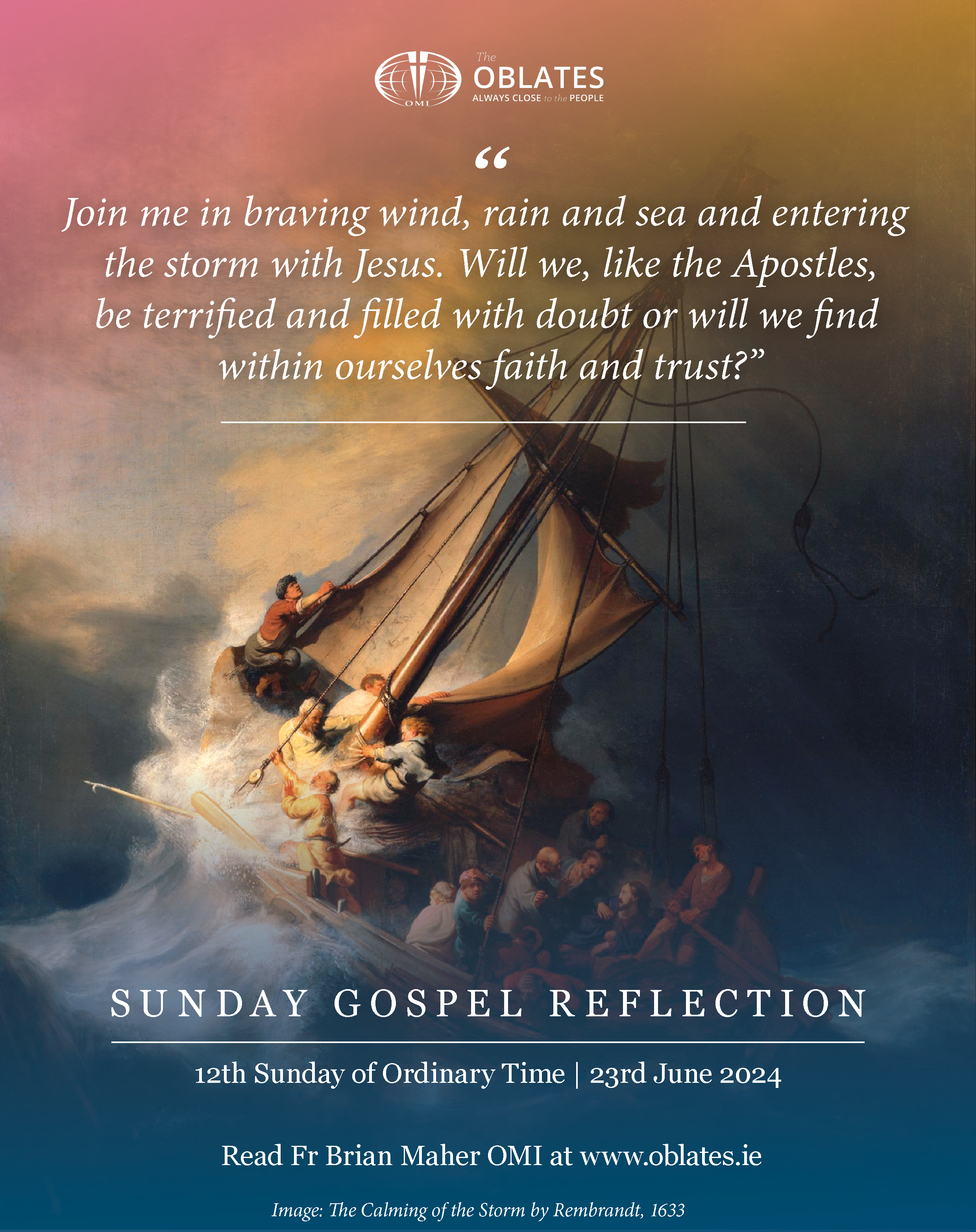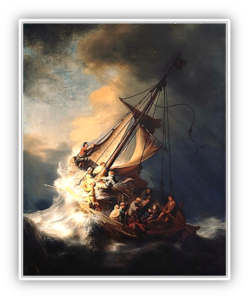Gospel Reflection for Sunday June 23rd 2024 – 12th Sunday in Ordinary Time By Fr Brian Maher OMI

Gospel Reflection for Sunday June 23rd 2024, 12th Sunday in Ordinary Time | Mark 4:35-41
Anyone who has ever done an ‘individually guided retreat’ (IGR) in the Ignatian tradition will almost certainly have spent time in prayer with this week’s Gospel. The ‘Storm at Sea’ is one of those Gospel stories which is so rich in symbolism that an entire retreat could be based around it. Indeed, it is so rich in symbolism that there is always a danger of overstating its meaning, thereby losing the simplicity and power of its message.
Firstly, as always, let’s put the story in context. It comes, as Mark tells it, immediately after the events related in the Gospel stories we have listened to for the last couple of Sundays. If you remember, we meet Jesus escaping ‘home’ in an attempt to find some rest. Even in the safety of his home he is not left alone. A curious crowd follows him, demanding cures and other miracles. Among the crowd are some people sent by the Pharisees in Jerusalem with the sole purpose of undermining his message and destroying his popularity. While dealing with this level of stress, his mother and brothers arrive, worried about him and wanting to take him away with them. It was not a great end to a stressful day!
The next morning he begins again, spending a long day teaching and preaching his message to as many as he could reach. He taught in parables, using very ordinary images to explain what he meant. He talked of a farmer scattering seeds in a field or carefully sowing them in the ground. He used the tiny mustard seed growing into a mighty tree to show that the Kingdom of God was near. As well as the time spent preaching to the crowds we also learn that he spent ‘private’ time with his disciples, explaining to them in more detail the meaning of the parables.
Today’s Gospel immediately follows these events. Jesus is more than just tired; he is exhausted in body and spirit. “Let us go over to the other side……” he says to them. My guess is his request sounded more like, “Please get me out of here!…” and that is exactly what they did.
With this as the background to the Gospel, let’s briefly follow the narrative before pointing to some of its meaning.
It seems clear the Jesus, at the end of another long and exhausting day needs to get away from the crowds following him. His Apostles and other close friends see his exhaustion and probably judge that heading across the lake is about the only way to escape the crowd. This might help explain why Peter and the others, all seasoned fishermen who knew intimately the dangers of being caught in a storm, risked setting out with him.
His tiredness might also explain why the next time we meet Jesus he is sound asleep in the stern (back) of the boat. As can happen, as soon as he is free from the stresses of the day he falls asleep.
Clearly, when the storm strikes there is panic in the boat. I must say I find it difficult to imagine professional fisherman, who spent their lives on the lake, being frightened and panicking to the extent described in the story. It is also difficult to imagine Jesus, no matter how exhausted he might be, sleeping through a storm that was swamping the boat, especially when Jesus was not himself a fisherman. It was either the mother of all storms or a certain amount of exaggeration for effect is taking place!
The dialogue that follows between Jesus and those in the boat is where we find the true meaning of the story. The concluding question the disciples ask each other, “Who is this man…?” lies at the heart of who we are as Christians, and it is the question Mark wants us to ask ourselves as we hear this Gospel today.
The central and most obvious image used in this story is that of ‘the storm’. As Mark describes it, the storm they found themselves in was devastating. The Greek word used to describe it is seismos, from which we get the word ‘seismic’, a word used to describe earthquakes and other earth-shattering events. Again, as Mark describes it, the storm came suddenly and without warning, plunging them almost instantly into a fight for survival. Rembrandt’s painting ‘The Storm on the Sea of Galilee’ marvellously, I think, captures both the violence of the storm and their frantic struggle to save the boat.
 The Calming of the Storm by Rembrandt, 1633 |
It is clear that the Apostles truly do fear losing their lives in this storm, and all the while Jesus, it seems, sleeps comfortably ‘on a cushion’. The tiny detail of the ‘cushion’ nicely contrasts the frantic activity of the apostles with the peaceful sleep of Jesus. ‘Storms’ are, of course, often used as analogies for life. Whether they come suddenly or gradually build, when they strike they leave us helpless, totally at the mercy of wind and rain. This storm happens ‘in the evening’, when light is fading or even gone. It is the time when, for us, the storms of life are at their worst. We toss and turn in bed as our troubles seem to multiply through the still watches of the night. |
Likewise, the storm takes the Apostles by surprise, striking without warning. For us, isn’t it the same? One moment we are doing fine and the next the bottom falls out of our world. One phone call and we find ourselves in the middle of a storm. One doctor’s visit and we are in a storm. One conversation and we are in a storm.
I remember reading once of what the writer called our ‘storm theology’. It is what we believe about God when storms come into our lives. When a crisis comes is God a ‘good’ God or a ‘bad’ God for allowing it to happen? When we pray during the storms that assail us, do we see God as caring or uncaring based on how he answers? In essence, our ‘storm theology’ is what we believe about God when things seem to be going horribly wrong.
Our storms have the ability to bring to the surface what is really going on inside us. They will reveal to us whether we live by fear or by faith? Most important, the way we react to God during a storm reveals the truth about ourselves, whether we want it to or not.
‘Whether we want it to or not….” We must always be careful that we don’t find ourselves writing speeches to God; saying to God how we would like to feel, rather than how we really do feel. We can so easily convince ourselves that we have faith and full trust in God when in fact we are terrified and filled with doubts.
When Jesus said, “I no longer call you servants, I call you friends…” we have to believe he meant it. When we are with a friend we have no need to write speeches. When with a friend we can say it as it is, knowing that we will be understood and not judged. This is what Jesus wants when we experience our own storms.
In the boat, as the waves lashed in, the Apostles were terrified for their lives. Despite seeing Jesus heal blindness and cure those with leprosy and other ailments, despite listening day after day to the message of love and forgiveness he taught, and despite the very presence of Jesus in the boat with them, they were terrified and doubted him. “Teacher, don’t you care if we drown?” says it as it is. Not only do they doubt, but they wonder if Jesus even cares about them. They had no time for speeches in that boat; there was no place for niceties and pretence when the next wave could mean death. At that moment their ‘storm theology’ was of fear and doubt, not of faith and trust – and they were his Apostles!
It is important, I think, to note that Jesus reminded them of their doubt and fear after he had calmed the sea. His first act was to put their minds at rest and calm their fears. Only then did he call on them to reflect on their faith. Jesus first action will always be to heal, forgive, calm and take away fear. Only later will he invite us, always gently, to deepen our faith and trust in him.
In the boat that night the Apostles were not prepared to die for Jesus. In anger they asked him if he even cared about them.
…… And yet, not many years later, every one of them willingly gave their lives rather than deny him or his message.
The reason for this change can be found in the question they asked each other at the end of the Gospel:
“Who is this man, that even the wind and waves obey him?” began a crucial, internal journey for them. As they came to know Jesus; to meet him as a friend and companion, their faith in him and their trust in him took root and grew so that when a later storm came, their ‘storm theology’ was no longer fear and doubt and they willingly died for him.
The same is true for us. As we come to know the person of Jesus as our friend and companion, especially when storms overtake us, our faith and trust will grow. Hopefully, we will never be asked to die for our faith, but we will truly be better witnesses to the Resurrection and we will radiate hope and confidence to a world that badly needs both at this time.
The Apostles answered for themselves the question “Who is this man?” and they discovered within themselves “a peace that the world could not give them.”
That peace also awaits us.
Many thanks,
Brian.
If you have any comments, questions or thoughts on this scripture reflection, please feel welcome to email me at b.maher@oblates.ie
| Gospel | Mark 4:35-41 |
|---|
‘Even the wind and the sea obey him’
https://oblates.ie/e-newsletter/
The Oblates are on social media:
Prayer Intentions
Weekly Reflections
Gospel Reflection Sunday 26th January 2025 | 3rd Sunday in Ordinary Time
Gospel Reflection Sunday 26th January 2025 | 3rd Sunday in Ordinary Time...
Gospel Reflection Sunday 19th January 2025 | 2nd Sunday in Ordinary Time
Gospel Reflection Sunday 19th January 2025 | 2nd Sunday in Ordinary Time...
Gospel Reflection Sunday January 12th 2025 / The Baptism of the Lord
Gospel Reflection Sunday 12th January 2025 / Baptism of the Lord | Luke...
Gospel Reflection Sunday January 5th 2025 / Epiphany of the Lord
Gospel Reflection Sunday 5th January 2025 / Epiphany of the Lord | Luke...
Gospel Reflection Sunday December 29th 2024, Feast of the Holy Family
Gospel Reflection Sunday 29th December 2024, Feast of the Holy Family | Luke...
Gospel Reflection Sunday December 15th 2024, Third Sunday of Advent
Gospel Reflection Sunday 15th December 2024, Third Sunday of Advent |Luke 3:10-18...

